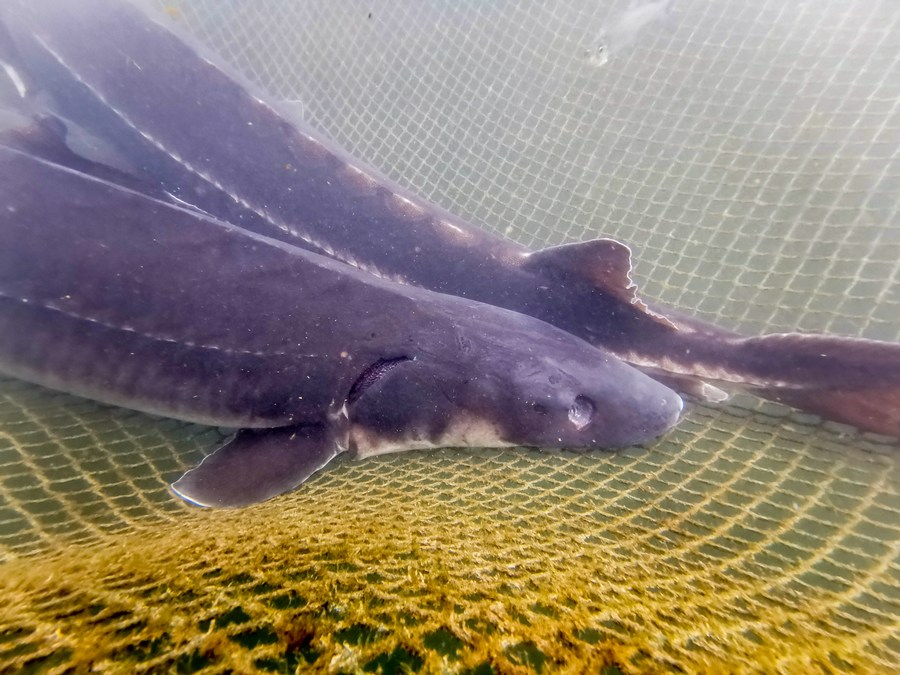Endangered fish species benefiting from Yangtze River protection efforts

Aerial photo shows a breeding base for rare fishes in the Three Gorges Reservoir in southwest China's Chongqing, Feb. 25, 2022. (Xinhua/Tang Yi)
CHONGQING, April 23 (Xinhua) -- Thanks to a series of protection measures, the Dabry's sturgeon, an endangered species under China's first-class national protection, can again now be spotted in the Yangtze River.
The Dabry's sturgeon is also known as the Yangtze sturgeon, named after its habitat, the upper Yangtze River. It had lost its natural ability to reproduce since 2000 due to overfishing and water pollution, among other factors. The International Union for Conservation of Nature declared the species extinct in the wild in July last year.
According to the Ministry of Agriculture and Rural Affairs, underwater cameras have recently captured the natural spawning of the Yangtze sturgeon and the eggs being hatched into seedlings. This proved that mature individuals in the artificial Yangtze sturgeon population have the ability to reproduce in the wild.
Overfishing was once a serious challenge that imperiled the Yangtze sturgeon and other rare and endemic fish species in the Yangtze River. To restore the biodiversity along the river, China implemented a full fishing ban in 332 conservation areas of the Yangtze River basin in January 2020. A year later, on Jan. 1, 2021, a 10-year fishing ban took effect in pivotal waters of the Yangtze.
Surprisingly, many fishermen have now become guardians of fish in the Yangtze River, as they make the most of their knowledge about fish and expertise in steering ships.
Zhang Song, who had relied on fishing for a living since 2000, volunteered to become a member of the fish protection team in Wanzhou District, southwest China's Chongqing Municipality, patrolling the Yangtze River and busting poaching and illegal fishing activities.
"I have to admit that my work is kind of strenuous, but I volunteered to shoulder the responsibility in a bid to ensure that our descendants can live along the Yangtze River with a good environment," Zhang said.
The Yangtze River Protection Law, China's first legislation on a specific river basin, came into force on March 1, 2021, strengthening oversight as well as the prevention and control of water pollution in the river basin. With this law, Zhang's work was bolstered and became easier.
"The 10-year fishing ban is conducive to biodiversity in the Yangtze River," said Mou Hongmin, deputy director of the fisheries research institute of Wanzhou District.
For most commercially viable fish species in the Yangtze River, 10 years will witness two to three generations of fish breeding. That's why the ban can restore fishery resources and enhance fish spawning, Mou said.
In addition, researchers have invested efforts in the artificial breeding of the Yangtze sturgeon and other critically endangered species. A school of Yangtze sturgeons swim freely at a rare fish breeding base in Wanzhou District, as Mou carefully observes their growth states.

Photo taken on Feb. 25, 2022 shows Yangtze sturgeons at a breeding base for rare fishes in the Three Gorges Reservoir in southwest China's Chongqing. (Xinhua/Tang Yi)
"Till now, we have successfully cultivated more than 100 parent Yangtze sturgeons and are now working on artificial breeding technological breakthroughs," Mou said. "The release of the captive-bred Yangtze sturgeons into natural waters will help restore its population."
In recent years, illegal docks and sand excavation activities that jeopardize the spawning sites of rare fish species have also been cleaned up in line with the Yangtze River Protection Law.
Once badly damaged by sand excavation activities, the bank of a section of the Yangtze River in Jiangjin District, Chongqing, has seen obvious environmental restoration over the past few years.
This section is likely to become a spawning site for Yangtze sturgeons and other rare fish species in the future, and full preparations are being made to welcome them home, according to a research team at Southwest University.
Photos
Related Stories
- Scientific expedition on Yangtze River headwaters launched in NW China
- Fish balls: a yummy delicacy from South China
- Colorfully lit snow sculptures, busy fish market add festive atmosphere in China's easternmost city
- The revival of large yellow croaker industry in Ningde, China
- Fish harvest in Qiandao Lake, east China
Copyright © 2023 People's Daily Online. All Rights Reserved.









